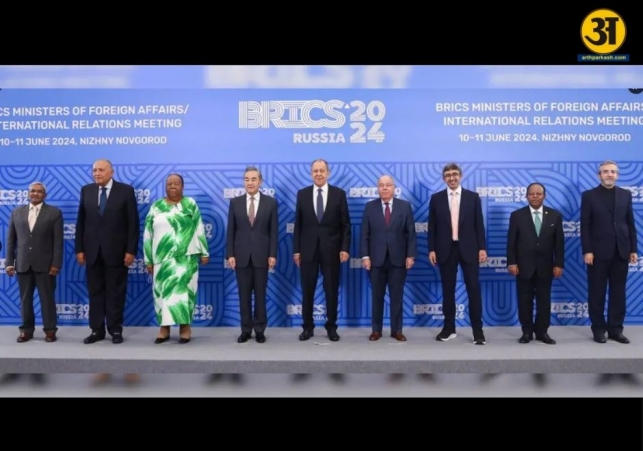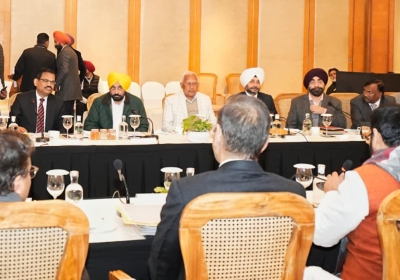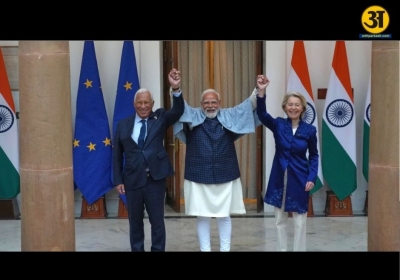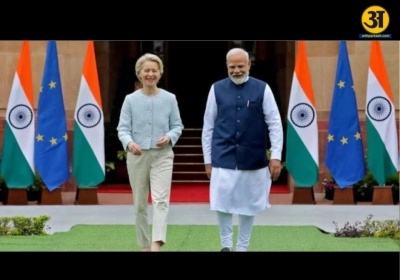
India, BRICS condemn military strikes on Iran
India joins BRICS members to express grave concern at military strikes on Iran
India has joined other BRICS countries in expressing serious concern over the recent military strikes on Iran. This decision came shortly after India refused to support a statement from the Shanghai Cooperation Organisation (SCO) that openly blamed Israel for the same attacks. Unlike the SCO, the BRICS group did not name either Israel or the United States in its official statement. This neutral tone made it easier for India to support the BRICS message.
The BRICS group—made up of Brazil, Russia, India, China, South Africa, Egypt, the United Arab Emirates, Ethiopia, Indonesia, and Iran—released the joint statement on Tuesday. It said that the military actions against Iran, which began on June 13, were a clear violation of international law and the United Nations (UN) Charter. The group added that these actions were making the security situation in the Middle East worse.
The statement read, “We express grave concern over the military strikes against the Islamic Republic of Iran since 13 June 2025, which constitute a violation of international law and the Charter of the United Nations, and the subsequent escalation of the security situation in the Middle East.”
The BRICS countries stressed the urgent need to stop the violence and return to peace. They warned that the current tensions could have dangerous effects not only in the region but also for the rest of the world. Rising conflict in the Middle East can affect global peace, economic stability, and oil prices.
The joint message also called on all countries involved in the conflict to use diplomatic channels to talk and settle their problems in a peaceful way. “We call on all parties to engage through existing channels of dialogue and diplomacy, with a view to de-escalating the situation and resolving their differences through peaceful means,” it said.
Concerns about nuclear safety and civilians
The statement showed deep concern about the attacks on nuclear facilities in Iran. According to the BRICS members, these attacks are dangerous and break international laws and rules set by the International Atomic Energy Agency (IAEA). They warned that even in times of war, it is important to protect peaceful nuclear facilities, as damage to such sites can harm both people and the environment.
The BRICS countries said, “Nuclear safeguards, safety, and security must always be upheld, including in armed conflicts, to protect people and the environment from harm.” They also said that they support all diplomatic efforts that aim to solve regional problems peacefully.
The group also asked for stronger protection of civilians and civilian buildings, such as homes, schools, and hospitals, in line with international humanitarian law. “Guided by the principles enshrined in the United Nations Charter, BRICS remains committed to promoting international peace and security and to fostering diplomacy and peaceful dialogue as the only sustainable path toward long-term stability in the region,” the statement added.
Another important point made by BRICS was the need to create a “zone free of nuclear weapons and other weapons of mass destruction” in the Middle East. This goal is in line with earlier international agreements and resolutions that aim to stop the spread of dangerous weapons in this sensitive region.
ALSO READ: Delhi High Court rules wife doesn’t need husband’s consent for passport
ALSO READ: Indian deposits in Swiss banks drop by 18% over the last decade
Background of the conflict
The current crisis began when hostilities between Iran and Israel escalated. Over 12 days, the United States joined the Israeli military in attacking Iranian nuclear facilities. Both sides have claimed victory after agreeing to a ceasefire on Tuesday. Iran said it managed to break through Israel’s defence system with its missiles and ended the conflict on its terms. On the other hand, Israel said it had achieved its main goal of destroying Iran’s nuclear sites.
Earlier this month, the SCO—another major international group that includes countries like China and Russia—issued a statement directly blaming Israel for the attacks on Iran. India chose not to support that statement. Officials said that India had informed the SCO about its views but did not take part in the meeting where the statement was written. India preferred a more neutral and balanced approach.
Now, by agreeing to the BRICS statement—which avoids pointing fingers—India has shown its support for peace and international law while keeping its diplomatic ties with all sides. It is clear that India wants to avoid getting caught in the middle of a conflict between the U.S., Israel, and Iran.
In conclusion, the BRICS group, with India’s support, is calling for peace, dialogue, and respect for international law in the Middle East. They are urging all countries involved to avoid further violence, protect civilians, and work together through peaceful means to prevent a larger conflict.





